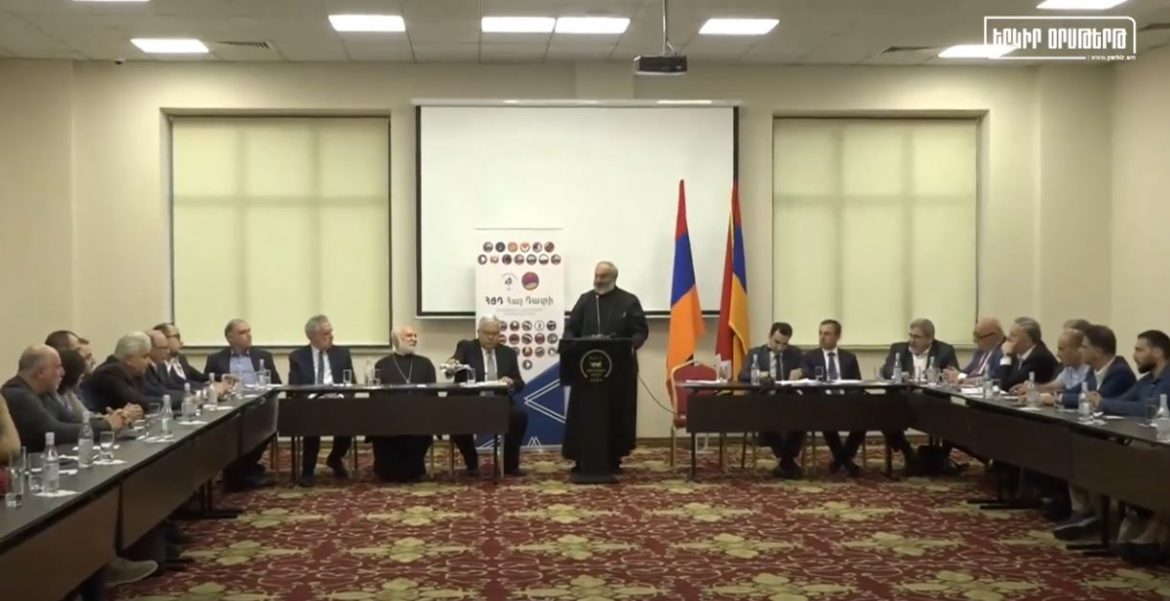In light of the depopulation of Artsakh and the increasingly tense security environment and existential threats faced by the Republic of Armenia, the ARF Bureau convened a conference for the Armenian National Committees and Offices. This conference aimed to discuss and coordinate the main directions of their activities and, if necessary, make certain tactical adjustments. The official opening took place today, May 25, in Yerevan.
The agenda focused on addressing the primary external challenges facing the Republic of Armenia and the Armenian people as a whole, and on the strategic use of the Armenian National Committees system’s potential to overcome these challenges.
Participants included representatives from the Armenian National Committees and Offices from more than twenty countries, as well as representatives of ARF party bodies.
The conference began with the national anthem of the Republic of Armenia.
Archbishop Nathan Hovhannisyan, Director of the Department of External Relations and Protocol of the Mother See of Holy Etchmiadzin, started his speech with a prayer and then conveyed the message of His Holiness Karekin II, Supreme Patriarch and Catholicos of All Armenians.
Speeches were delivered by Ishkhan Saghatelyan, representative of the ARF Supreme Body of Armenia; former Minister of Foreign Affairs of Armenia Vartan Oskanian; Primate of the Diocese of Tavush, Archbishop Bagrat Galstanyan; Hagop Der-Khachadourian, representative of the ARF Bureau; Ara Puluzyan, representative of the ARF Central Committee of Artsakh; and Giro Manoyan, head of the ARF Bureau’s Office of Armenian National Committees and Political Affairs.
In his speech, Ishkhan Saghatelyan stated, “They force us to renounce our past in order to govern us. You prove that those who correctly articulate their own interests not only do not remain alone on the international stage but can even find allies in the most unexpected places. Armenians living in the homeland equate the activities of the Armenian National Committees offices with the protection of Armenian interests.”
Vartan Oskanian noted, “ARF structures have contributed greatly to Armenia and the Armenian people for many years. I am a witness to this.” He highlighted a significant gap between the interests of the Armenian nation and those of the Armenian authorities. According to him, the authorities’ goal is to erase the stigma of the disaster they brought, blame others, and retain their power and position.
Archbishop Bagrat addressed the issue of the Armenian Genocide, emphasizing that this issue should be present in all areas of our lives. “For us as a nation, it is very important that the issue of the Genocide, because all our problems currently inevitably derive from it, moves from the field of emotion and mere demands to a systematic and rational domain, spreading into all layers and spheres of our lives as an ideology,” he said.
Hagop Der-Khachadourian declared, “For us, the issue of Artsakh is not closed; the last ‘war’ was simply the loss of a battle.” He emphasized the clear demands for the right of return, international guarantees, and an interim status until the final status is determined. “This is the reality for which we must fight at all costs.”
Despair in any form is not acceptable for the ARF. “Naturally, we live in such fateful days that we must record our darkest days, but we have no doubt that we will win, just as we will undoubtedly win the terrible struggle taking place within Armenia against national values and our cherished cause,” said the ARF Bureau representative.
For the people of Artsakh, the primary issue is the right of return. “For Artsakh people, the primary issue is the right to return to Artsakh,” said Ara Puluzyan, representative of the ARF Central Committee of Artsakh.
At the end of the conference, Giro Manoyan stated, “We must overcome not only the behavior and obstacles of Turkey and Azerbaijan but also the anti-national policies of the homeland’s government.”
According to him, the current anti-state policies of the Armenian authorities are especially problematic when foreigners point them out. “It is problematic when foreign circles, pointing to the positions of the current Armenian authorities, justify their passive or even negative attitudes. This allows them to say, ‘If your own are doing this, we will not be more Armenian than they are.'”
During the conference, participants gave interviews to various media outlets.




